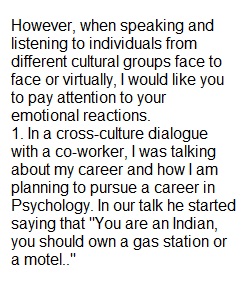


Q In counseling, it is very important to be mindful of cultural tendencies in communication and emotional expression. However, it is difficult to understand every single subcultural tendency if we have limited exposure to individuals from different cultures. In the previous week, we began to explore our cultural identity. Therefore we were able to share and listen to other's cultural factors and experience. Active listening and cultural humility are great skills when working towards multicultural competence. However, when speaking and listening to individuals from different cultural groups face to face or virtually, I would like you to pay attention to your emotional reactions. As I teach this class semester to semester, I learn that one of most prevalent themes that students have is a fear of offending another individual due to "not knowing" that they are engaging in a way that is offensive to another person (or microaggression). These fears can limit our efforts to engage cross culturally and prevent us from learning and appreciating another person's cultural experience.
Q Therefore, this week, I encourage you all to discuss the following 1. Briefly list/summarize (in less than a paragraph) an actual interaction, response and/or statement that occurred between you and another person cross-culturally that offended you. For example, my intra cultural factors (achieved high education, grew up with low income, past experiences of prejudice based on ethnicity, gender, age, and regional affiliation), promotes a cultural value of academic achievement and economic advancement in order to obtain privileges and reduce barriers. In a cross-cultural dialogue, I spoke with a coworker about my decision to enroll my child in a private educational setting instead of public school. In our interaction, she provided statements like...why would you do such a thing, what does your mother think, did you even look at the public school to make them give her services. Her questions challenged my decision making skills as a single mother economically (socioeconomic culture), an adult (age culture), and as an African American who has past experiences of discrimination linked to education, low income, and career (ethnicity). At that time, I felt horrible but I had a hard time explaining why because cross culturally I wasn't sure if it was safe enough to explain the depth of the decision. From her end, she was a polite curious woman that simply didn't understand my decision. This was a difficult cross cultural dialogue for me but perhaps not for her. Please share your experiences and how they linked to your cultural factors. 2. List an alternative suggestion that could have promoted a cross-cultural response or experience that would have been more appropriate.
Q In my example, the person asked questions quickly and was direct in her speech. An alternative suggestion for her is to ask her questions openly and give me enough time to answer thoughtfully. I would have liked for her to engage in active listening and perspective taking to truly understand what I experienced that led to my decision. I also would have appreciated her feedback on ways that she navigated education decisions with her children so that the communication could feel more authentic between two mothers vs judgemental and disapproving. Again these are counseling skills that are helpful in regular day to day communication. But it allows for more open dialogue and understanding between two individuals. 3. Lastly, list at least one topic or statement that you feel is offensive towards you and that other groups don't realize...As well as why that topic or statement is offensive. A statement that is offensive when used in the wrong way is "Oh well I have other ___ friends so I'm not [classist, racist, sexist, or homophobic]". A statement about having multicultural friends is not offensive for me when it is used in typical conversations. However, it is offensive for me if used in defense. For instance if I am speaking with a person and if I say I don't like what you said about Black women, that really isn't true for all of us, and a person responds...Oh, it is true and, I have plenty of Black friends to prove it; the statement dismisses my original concern and invalidates what is true for me as and actual Black woman.
Q This is a long post, but I encourage you to think through it and actively listen to your group mates responses. Try to keep it brief if possible. Consider what your group mates are saying before you respond. Do some perspective taking to try to understand why they share what they share. Think through how their cultural experiences could impact what is offensive to them. There is no right or wrong answer and there may be some comments that are difficult to agree or disagree with for these posts. These are simply statements based on what each group member has experienced. I encourage you to use respect in the way you respond and use safe space to think through each statement.
View Related Questions